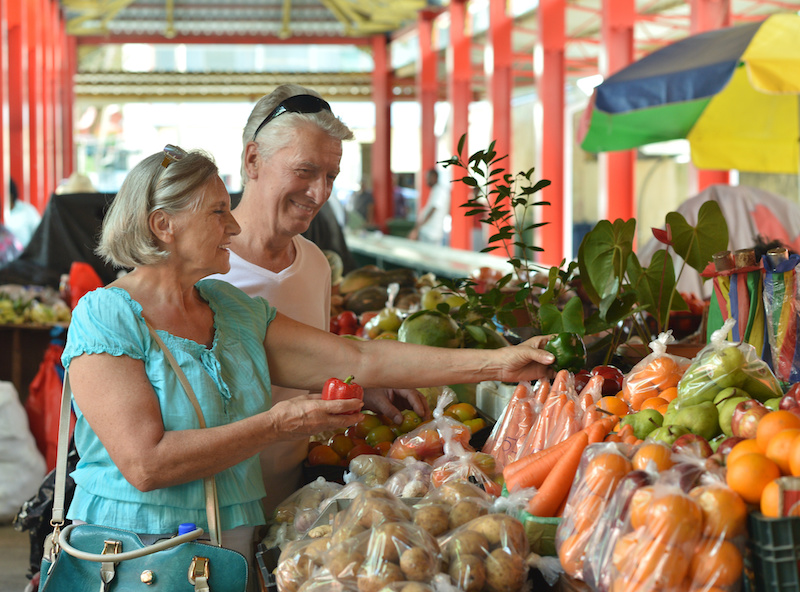Around the age of thirty years, the strength and vigour of the human body naturally begins to decline. There are gradual losses we have to accept as we make our way into our older adult years; less elasticity, less muscle and bone mass, less energy and physical efficiencies. Decades later, we reach a time when our health is simply much more vulnerable than younger adults and it takes a different effort to take good care of our health.

We cannot avoid the natural consequences of ageing, but embracing a healthy lifestyle does a lot to help us enjoy our senior years. Older adults have unique nutritional needs and challenges, and this often demands changing lifelong eating habits. While overweight can be an issue for some seniors, malnourishment is much more common and the causes of this are variable. The diminishment of senses, such as smell and taste can lead to a disinterest in food. Living alone; preparing most of your meals just for one and eating all by oneself can similarly lead to a lack of concern about nutrition that the elderly cannot afford. Chronic health issues associated with ageing can lead to a poor appetite or an avoidance of eating.
In general, seniors do need fewer calories, but more nutrients. The body’s ability to efficiently absorb vitamins and minerals declines, and therefore nutrient-rich meals become even more important. According to Cath Day, a registered dietitian and spokesperson for ADSA, the Association for Dietetics in South Africa, ageing healthily requires greater intake of calcium, magnesium and folate, as well as of Vitamins B12, D, E and K. She says, “These needs can be met with a varied diet of healthy foods. However, good nutrition exists in the context of a healthy lifestyle. Interestingly, meals that promote social interactions for older adults in a variety of settings are associated with improved food and nutrient intake or nutritional status.” There are no guidelines for the elderly to take nutritional supplements as a matter of course, but Day adds, ”If deficiencies are noted, supplementation becomes imperative as these need to be corrected through therapeutic supplementation and under the supervision of the medical team.”
Another nutritional priority for seniors is to focus on their protein intake. Sarcopenia is, most commonly, age-related muscle degeneration which leads to weakness, frailty, delayed wound healing and other vulnerabilities in seniors. Even if it cannot be prevented, you want to decelerate sarcopenia. Day says, “As dietitians, we often find that older people – over 70 years of age – are less efficient at using the protein in the food they eat. This means that they may not be getting enough. Seniors who suffer from a loss of appetite should monitor their protein consumption strictly. Tips include eating protein at each meal instead of only at lunch or dinner. Add yoghurt, cheese or egg for breakfast instead of only eating marmalade on toast. Include protein in your snacks by switching from sugary biscuits or a packet of crisps, to peanut butter and banana on toast, or whole-wheat crackers topped with either cottage cheese, sardines or beans.”
The loss of muscle mass also leads to a lower fluid requirement; but despite less need, the elderly still have a much higher risk of dehydration. The reasons for this are variable – it could be a side-effect of medication, a fear of incontinence or simply the diminishment of thirst as the self-regulatory mechanism against dehydration. Seniors need to be aware of the risk; monitor their hydration and adjust their fluid intake accordingly.
While a healthy old-age demands this kind of focus on nutrition and, the adoption of different eating habits, Day reminds that diet alone cannot make people live well for longer. She says, “A varied diet made up of good quality protein, lots of fresh vegetables and fruits, beans and legumes, whole-wheat breads and brown rice, healthy fats such as olive oil is vital. However, seniors need to embrace other healthy living habits as well.”
Healthy lifestyle habits also include:
- Maintaining a normal weight
- Getting regular physical exercise.
- Drinking alcohol sensibly
- Not smoking.
- Finding your purpose in life as a senior and interacting socially often, such as sharing meals with family and friends; going on outings; pursuing interests and hobbies; learning something new.
- Assessing your stress levels and managing your stress if necessary through meditation or yoga or mindful techniques such as deep breathing.




























